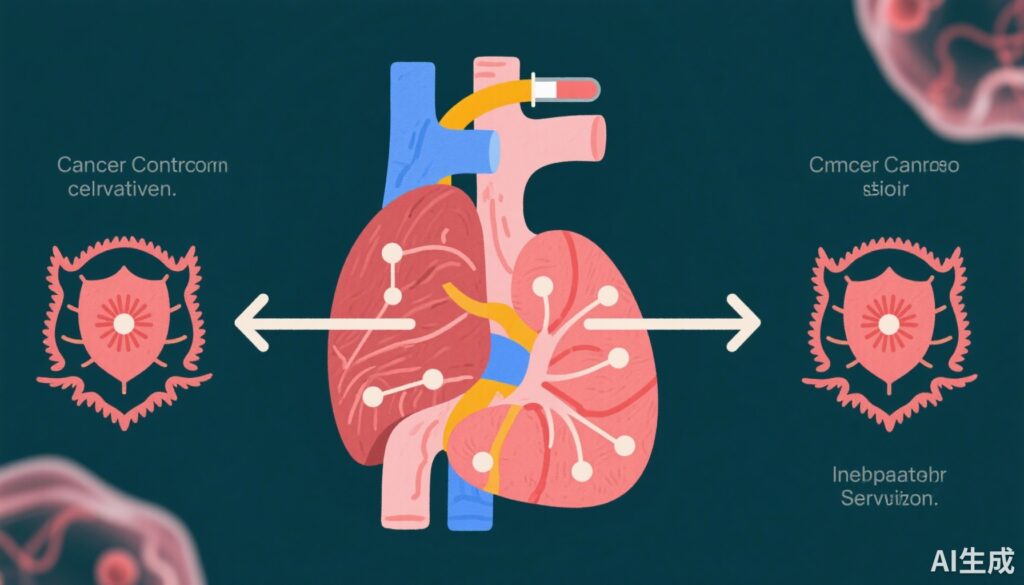Introduction and Clinical Context
Immune checkpoint inhibitors (ICIs), including agents targeting programmed cell death protein-1 (PD-1) and its ligand (PD-L1), have revolutionized oncology by significantly improving survival outcomes in various advanced-stage cancers. However, their use in solid organ transplant recipients (SOTRs) presents a unique challenge: the potential for immune-mediated transplant rejection. SOTRs are inherently immunosuppressed to prevent allograft rejection, yet ICIs activate T-cell responses that may jeopardize graft survival.
This clinical dilemma has led to limited data and clinical uncertainty regarding the safety and efficacy of ICIs in this vulnerable population. Patients with a prior transplant who develop advanced cancers often face few effective options due to limited treatment choices, underscoring the importance of understanding the risk-benefit profile of ICIs in this setting.
This systematic review and individual participant data meta-analysis aim to clarify the outcomes—cancer control and graft survival—among SOTRs treated with ICIs, providing insights to guide clinical decisions and future research.
Study Design and Methodology
The study comprehensively searched electronic databases, including MEDLINE, Embase, and clinical trial registries, from inception to June 2024, without language restrictions. It included case reports, case series, observational studies, and clinical trials reporting on advanced cancer treatment with ICIs in adult SOTRs.
Researchers extracted individual-level data and synthesized results using a single-stage random-effects model to account for heterogeneity. The primary outcome was time to cancer-related death, while secondary outcomes included time to first rejection episode and objective tumor response per Response Evaluation Criteria in Solid Tumors (RECIST 1.1).
Statistical analyses employed Cox proportional hazards models to assess factors associated with outcomes, adjusting for potential confounders such as cancer type, immunosuppressive regimens, and baseline characteristics.
Key Findings
A total of 128 studies involving 343 SOTRs treated with ICIs were included. The cohort was predominantly male (76.9%), with a median age of 63 years (IQR 14-88), and most recipients had kidney transplants (70.9%). The majority received PD-1 inhibitors (72.9%).
Cancer Outcomes:
– Within three years of ICI initiation, approximately 52.8% (95% CI, 43.9%-61.6%) of patients succumbed to their cancers.
– Objective tumor response at one year was observed in 31.6% (95% CI, 25.0%-37.7%) of cases.
– Notably, patients with cutaneous squamous cell carcinoma (cSCC) demonstrated higher response rates (61.0%, 95% CI, 45.5%-76.4%) than those with melanoma (48.5%, 95% CI, 26.8%-70.3%) or other solid organ tumors.
Graft and Rejection Outcomes:
– Acute rejection episodes occurred in 36.2% (95% CI, 30.7%-41.7%) of patients within one year.
– Graft loss was documented in 18.4% (95% CI, 13.7%-23.1%) at one year.
– Melanoma patients exhibited an increased risk of rejection (HR, 2.88; 95% CI, 1.69-4.90) compared to cSCC.
Factors Influencing Outcomes:
– Cancer-specific survival was poorer in patients with melanoma (HR, 2.29; 95% CI, 1.31-3.99) and other solid tumors (HR, 2.84; 95% CI, 1.70-4.74) relative to cSCC.
– Immunosuppressive regimens adjusting for rejection risk indicated that concurrent use of steroids and mammalian target of rapamycin inhibitors (mTORIs) was associated with a reduced risk of rejection (HR, 0.30; 95% CI, 0.14-0.63).
This study highlights the heterogeneity of outcomes based on cancer type, with better tumor response in cSCC and higher rejection risk in melanoma. The findings suggest that tailored immunosuppressive strategies may mitigate rejection while maintaining anti-tumor efficacy.
Expert Commentary
This comprehensive analysis advances understanding in a complex clinical area. The variation in outcomes underscores the importance of individualizing ICI therapy in transplant recipients, considering both tumor type and immunosuppressive management. The higher tumor response in cSCC aligns with known sensitivity of skin cancers to immune modulation.
The elevated rejection risk, especially in melanoma, emphasizes the need for vigilant monitoring and potentially prophylactic immunosuppression adjustments. The protective effect of mTORIs and steroids against rejection suggests these agents may be preferred adjuncts during ICI therapy. However, the study’s retrospective nature and heterogeneity in study designs warrant cautious interpretation.
Limitations include the small sample size for certain cancer types and lack of standardization in immunosuppressive regimens. Future prospective studies and clinical trials are essential to establish optimal management strategies.
Conclusion and Future Directions
This systematic review confirms that ICIs can confer tumor responses in SOTRs, particularly in cSCC, but at the expense of increased rejection risk. Strategies incorporating mTORIs and corticosteroids may mitigate this risk. Personalized approaches balancing oncologic benefits with graft preservation are critical.
Further research should focus on prospective trials, biomarkers for rejection risk, and standardized immunosuppressive protocols to optimize patient outcomes. This work paves the way for safer integration of immunotherapy in transplant oncology, ultimately improving survival for this high-risk population.
Reference:
Saleem N, Wang J, Rejuso A, Teixeira-Pinto A, Stephens JH, Wilson A, Kieu A, Gately RP, Boroumand F, Chung E, Bonevski B, Carlino MS, Carroll R, Lim WH, Craig JC, Murakami N, Wong G. Outcomes of Solid Organ Transplant Recipients With Advanced Cancers Receiving Immune Checkpoint Inhibitors: A Systematic Review and Individual Participant Data Meta-Analysis. JAMA Oncol. 2025 Oct 1;11(10):1150-1159. doi: 10.1001/jamaoncol.2025.2374. PMID: 40545616; PMCID: PMC12183638



